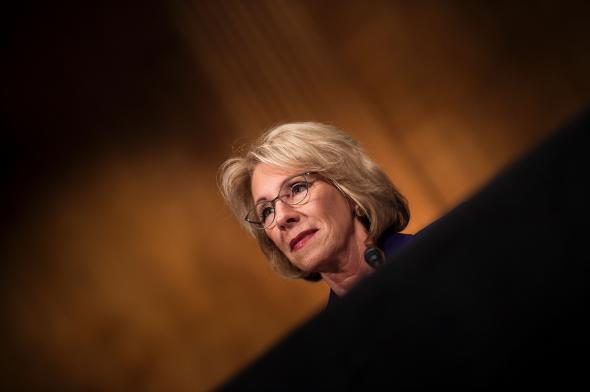Of all of Donald J. Trump’s controversial Cabinet choices, Betsy DeVos, his nominee for secretary of education, will likely come closest to falling short of Senate confirmation. But after a bumpy hearing last month, declarations by two Republicans that they can’t in good conscience vote her through, and a probably futile Democratic “talk-a-thon” that kicked off Monday on the floor of the Senate, it seems DeVos will only secure her spot by dint of the intervention of Vice President Mike Pence, who will be called on to cast a tie-breaking vote. (Update, Feb. 7, 12:32 p.m.: And that’s exactly what he did, allowing the Senate to confirm DeVos, 51-50.)
What distinguishes the resistance to DeVos from the groundswell of opposition to the administration’s other nominees is that it’s not just liberals who are unhappy. Rather, in addition to the expected progressive outrage over DeVos’ history of advocating for school vouchers; championing charterization; and, at her hearing, defending having guns in schools (yes, the thing about grizzly bears), there are important conservatives resisting too. On both the now-powerful Breitbart flank of the movement and among moderates, Republicans have come out against President Trump’s choice—more than you would expect given the 50 GOP senators who appear likely to vote for her. All of this says something about the Republican Party, where some members are bucking the president just three weeks into his term, and about the debates over reforming education that will take place over the next four years: In 2017, there’s no conservative unity on education policy.
To understand all this, it’s important to note the 1990s charter school movement that seemed to sweep the country didn’t quite reach all states. Rather, a handful—mostly in the Great Plains and Appalachia—held out. Those states—Montana, North and South Dakota, Nebraska, Kentucky, West Virginia, and Vermont—have one thing in common: Compared with the rest of America, they have many fewer people in cities. That feature is not coincidentally shared by Maine and Alaska, the states represented by Susan Collins and Lisa Murkowski, the Republican senators who will definitely vote against DeVos. And, not coincidentally either, in both senators’ states, the charter school movement was slow to take seed: In Maine, there are seven charters in operation, and in Alaska, 29. Here’s what this adds up to: In some of the reddest states in the union, where in most cases Republicans control both houses of the legislature, conservatives haven’t bought the school choice doctrine DeVos has been selling. They’re still largely reliant on traditional public schools.
The two defecting Republican senators—who will likely incur the enmity of a new president not known for forgiveness—realize this. It’s why, in her press statement last week, Murkowski of Alaska singled out school choice in explaining why she will be trying to vote DeVos down. “I have serious concerns about a nominee to be Secretary of Education who has been so involved in one side of the equation - so immersed in the push for vouchers - that she may be unaware of what actually is successful in public schools, and what is broken or how to fix them,” she said. Collins was no less focused. Speaking on the Senate floor this time last week, she said DeVos’ “concentration on charter schools and vouchers” raised “the question of whether or not she fully appreciates that the Secretary of Education’s primary focus must be on helping states and communities, parents, teachers, school board members, and administrators strengthen our public schools.” She concluded: “I will not, I cannot vote to confirm her as our nation’s next Secretary of Education.” These sound like the words of a blue-state Democrat or a union boss, but they come from one senator whose state voted for Donald Trump over Hillary Clinton 53 to 38 percent, and another in whose state the GOP controls the entire legislature and the governorship. Though most rural, Republican moderates in the Senate will vote DeVos through today, their home states are divided on what she will do.
In their opposition to DeVos, Republican moderates have unlikely company. If the election of Trump as president and the presence of Steve Bannon in Trump’s inner circle has proved anything, it’s that the far-right fringe of the party wields clout. In DeVos, they don’t like what they see. Some members of this constituency—which includes states rights activists, nationalists, and small-government conservatives (not to mention the outright racists and xenophobes)—voted for a Trump administration in the hope it would bring an end to Common Core, their favorite education policy bête noire. But that isn’t on DeVos’ radar. Coupled with DeVos’ pledge to keep implementing the requirements of the Every Student Succeeds Act—the bipartisan successor to the Bush administration’s No Child Left Behind Act that cleared Congress in 2015—conservative activists see the president’s choice as an abject betrayal. “Despite Trump’s lambasting of Jeb Bush’s education policies, the list of staffers looks more like the choices that would have been made under a Jeb Bush administration,” wrote Erin Tuttle of Hoosiers Against Common Core last month, citing a Politico story pointing out the number of former Jeb staffers hired by the new administration. On Breitbart, writer Susan Berry has been driving home this argument too. DeVos won’t put “the needs of students and their parents’ decision for their education first,” she’s declared.
Let’s just remember it’s the third week of life under President Trump, with Republicans in control of the House and the Senate. In Betsy DeVos, the new president has succeeded in choosing an education secretary who unites in their disdain liberals, rural Republicans, and writers at Breitbart. That’s quite an achievement.
